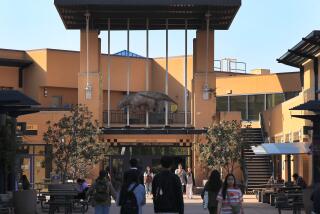Some See Graduate School as Haven in Slow Economy
- Share via
WASHINGTON — America’s new college graduates have found a way to get around the current slump in the U.S. job market: They are flocking to enroll in graduate schools to help mark time until the economy improves.
The Council of Graduate Schools, which tracks enrollment nationwide, says applications for graduate programs in arts and sciences are up 10% to 15% from last year’s levels, while the number of new entrants for graduate business schools is keeping pace with the mid-1980s boom.
Interest in law and medicine is up, too. The Law School Admissions Council expects a record high 95,000 applicants to flood the 176 accredited law schools by August of this year--a 15% jump over 1990 levels. And the Assn. of American Medical Colleges is anticipating a 14% increase in applicants this year.
University administrators say most applicants for graduate school still are enrolling because they believe the extra education will benefit them over the longer-run, not simply as a way to wait out the recession.
“Graduate schools are nice places to hide out, but so is Europe,” notes Victor Lindquist, editor of the Lindquist-Endicott Report, an annual survey of employment trends for college graduates.
Many graduate students concede that they would not be in school now if the economy were more robust.
Craig Lobdell is one example. Lobdell, 22, could not find a job when he was graduated from Carleton College this year, so he enrolled in George Washington University to study international affairs.
Lobdell says he would rather have waited a few years before going to graduate school, but had little choice.
The trend is being abetted by the efforts of some colleges to attract more graduate students by providing discounts on tuition. George Washington University, for example, is offering a 50% cut on tuition in 28 of its 185 MA programs where enrollment is below par.
This is not the first time that a recession has sent graduate school enrollments climbing. And Lindquist points out that the number of jobs has been shrinking for the past several months, particularly in white-collar fields. “This is the worst I’ve seen in 20 years,” he says.
To some students, applying to graduate school is a way to hedge their bets on available options.
That was the approach taken by Sally, who was graduated with a degree in English last year and has been doing temporary secretarial work while she hunts for a job in her field. (Sally asked that her last name not be used for fear that it would hurt her with prospective employers.)
“Basically it’s as easy to get rejected from graduate school as it is to get a job rejection--so most people apply for both,” Sally says. But she also defends her decision to apply to several graduate schools on grounds that today’s job market demands an advanced degree.
“I thought people were joking when they said you need at least a master’s degree to get any type of serious job here in Washington,” Sally says. “They weren’t.”
One glitch in the students’ plans is that graduate schools by and large have not increased their capacity to meet the higher demand, so some students are piling up rejection slips from universities almost as rapidly as they are accumulating them from prospective employers.
Last year, Lobdell and five housemates at Carleton College began pasting acceptances and rejections from both employers and universities on abutting kitchen walls--one labeled the Wall of Fame and the other (for rejections) the Wall of Shame.
“By the end of the year, there were six letters on our Wall of Fame,” Lobdell says. “But our Wall of Shame was plastered with job and graduate school rejections. It was a group effort, but each of us got about six to 10 rejections.”
Of the six students, two went to graduate schools, one joined Teach America, and the other three took jobs that were not related to their careers.
More to Read
Inside the business of entertainment
The Wide Shot brings you news, analysis and insights on everything from streaming wars to production — and what it all means for the future.
You may occasionally receive promotional content from the Los Angeles Times.










